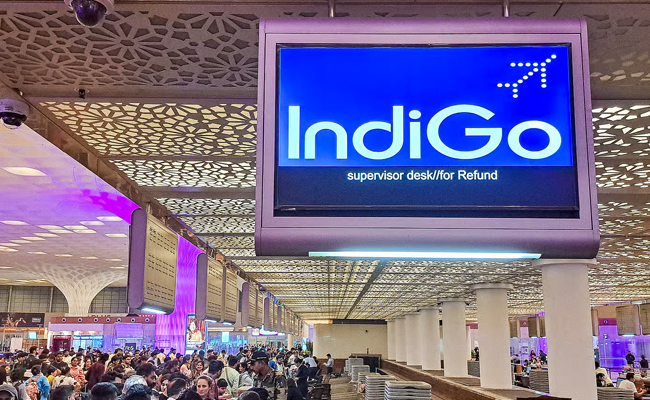New Delhi, May 12: Even as it is buffeted by bribery probes in several countries, aviation major Airbuss operation in India has flown into turbulence with reports of a whistleblower alleging graft in a chopper deal and the leak of sensitive classified information causing alarm in the government.
The Economic Times on Friday reported that Airbus Group has informed the Defence Ministry of an internal investigation into the allegations of the whistleblower over the tender for 14 twin-engine EC725 helicopters for the Indian Coast Guard. The deal is estimated to be worth Rs 2,000 crore.
According to the report, what has alarmed the government is that the whistleblower's letter making the allegation of graft had several highly classified documents attached to it.
When contacted, a senior Airbus Spokesperson said: "Airbus takes all whistleblower allegations very seriously and investigates such allegations thoroughly to ascertain any breach of its code of ethics and compliance. Airbus is fully dedicated to complying with its commitments and obligations under the Indian law."
He added: "Airbus will not comment on details of the press report concerning an Airbus Helicopter campaign."
Earlier, in February, Airbus had expressed that the commercial bid for the chopper deal that it had won, valid till February 15, had not been extended - and had therefore lapsed. Airbus had, however, refused to give any further details or the reasons behind the decision.
It is now being speculated that the whistleblower's allegation and the leak of documents, which first surfaced in December last year, may have been the reason for the non-extension of its commercial bid for the chopper deal.
According to the ET report, the anonymous letter sent to the Defence Ministry alleged that "benchmarking norms were changed and spare engine price calculations were hidden to favour Airbus and named three top coast guard officers as beneficiaries".
The report also alleged that "fugitive arms dealer Sanjay Bhandari and former business consultant Deepak Talwar, both of whom left the country after cases were registered against them by investigating agencies, acted as agents for Airbus".
The chopper deal was important for the Indian Coast Guard as it would have fulfilled its requirement for an advanced helicopter to step up its maritime surveillance so as to prevent a repeat of the Mumbai terror attacks of 2008.
Currently, the Coast Guard has aging Chetak helicopters and the Advanced Light Helicopter --Dhruv -- in its fleet.
While the Defence Ministry first began its conversation with Airbus almost six years back, the commercial bid for 14 of these medium lift helicopters was made in 2015, and Airbus had emerged as the lowest bidder.
The deal also involved offsets worth Rs 600 crore, and a maintenance, repair and overhaul (MRO) facility was to be set up in Goa.
"Airbus is engaged with the Indian Coast Guard and the Ministry of Defence to fulfil the need for 14 twin-engine heavy duty choppers following a campaign in which Airbus emerged as the lowest bidder by a very wide margin," the Airbus spokesperson told here.
Airbus's India troubles come at a time it is bracing for a difficult landing over corruption allegations in several countries. According to media reports, the company's woes are a result of its use of "commercial agents" - or intermediaries -- who specialise in "difficult" territories where they can assist multinationals in securing contracts.
Often characterised as consultancy, such work can be legitimate where it involves technical advice, such as regulatory best practice when bidding for a government contract. In other instances, it is nothing more than a euphemism for knowing who to bribe and for how much, a report in The Guardian newspaper said.
According to another media report, trouble for the group began in 2014, when an internal review of supplier payments at Airbus exposed irregularities. It ended up reporting itself to Britain's Serious Fraud Office and to France's equivalent body for lying to export-credit agencies about bribes given by third-party consultants to secure sales.
In October last year, Airbus said it may have violated American rules on arms exports because of fees paid to sales agents to secure deals. Austrian and German authorities are also investigating bribery claims tied to the sale of $2.1 bn-worth of Eurofighter jets back in 2003, the report said.
Let the Truth be known. If you read VB and like VB, please be a VB Supporter and Help us deliver the Truth to one and all.
Bengaluru (PTI): The Karnataka government has issued directions to municipal corporations across the state to regulate and prohibit feeding pigeons in public places, citing serious public health concerns.
Deputy Secretary to Government V Lakshmikanth has written to the Urban Development Department requesting it to issue directions to the Greater Bengaluru Authority (GBA) and all municipal corporations to take immediate steps to implement the measures.
In an official note dated December 16 issued by the Health and Family Welfare Department and released to the media on Wednesday, the department said uncontrolled feeding of pigeons in public places has resulted in large congregations of birds, excessive droppings and serious health concerns, particularly respiratory illnesses linked to prolonged exposure to pigeon droppings and feathers such as hypersensitivity pneumonitis and other lung diseases.
ALSO READ: Chinese GPS tracker found on seagull near Karwar Coast
"The commissioner, the Greater Bengaluru Authority and the Commissioners and chief officers of other municipal corporations shall take necessary action to mitigate the causes of dangerous disease spread by pigeon and enforce specified guidelines in their respective jurisdiction," the note said.
According to the department, these include a prohibition on feeding pigeons or causing pigeons to be fed in areas where it may cause nuisance or pose a health hazard to the public. Pigeon feeding shall be permitted only in designated areas in a controlled manner, subject to certain conditions.
"The designated areas may be selected in consultation with stakeholders. The responsibility for upkeep of the designated areas and compliance to the directions shall be taken up by some charitable organisation or an NGO. The feeding in designated areas shall be permitted only for some limited hours in the day," it said.
The note further stated that authorised officers of local authorities shall issue on-the-spot warnings and may impose fines for violation of the order, or lodge complaints to prosecute offenders under Sections 271 (Negligent act likely to spread infection of disease dangerous to life) and 272 (Malignant act likely to spread infection of disease dangerous to life) of the Bharatiya Nyaya Sanhita.
It also directed local authorities to conduct public awareness campaigns, including the display of signboards, banners and digital messages, explaining the health hazards associated with pigeon droppings and feathers, the content of the regulatory directions and penalties for violations, and alternative humane methods of bird conservation that do not endanger public health.





